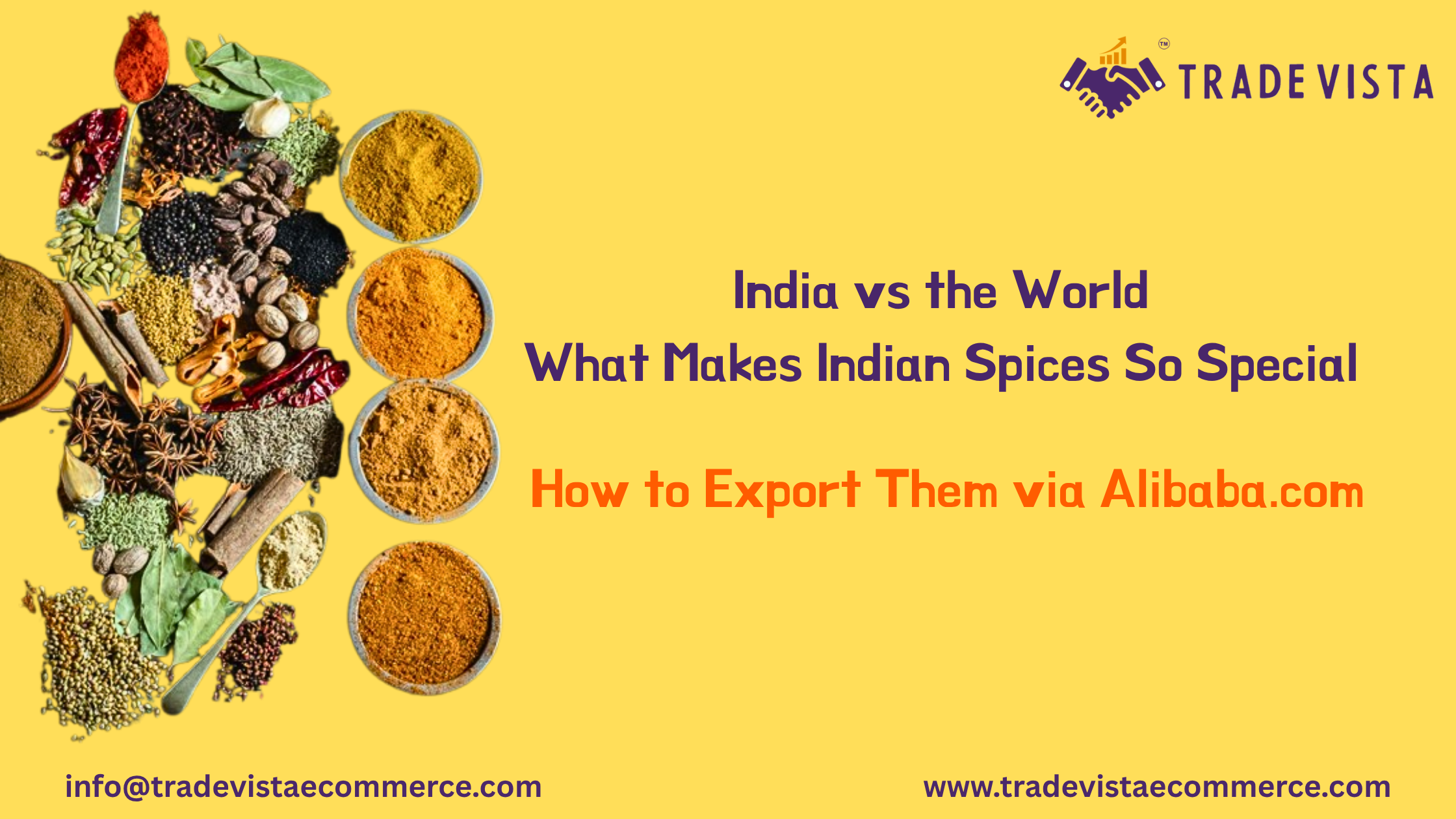India has been known as the Land of Spices for centuries. From black pepper and cardamom to turmeric and cumin, Indian spices have profoundly influenced culinary traditions worldwide. In 2025, India is expected to remain a leading global supplier of high-quality spices. The country exported over ₹47,225 crore worth of spices in 2024– 25, marking a steady rise in global demand.
This blog explores what makes Indian spices unique and how small businesses can tap into international markets using platforms like Alibaba.com. Whether you are a farmer, trader, or spice manufacturer, this guide is designed to help you start and scale your export journey.
What Makes Indian Spices Unique?
1. Diversity of Varieties
India grows over 75 types of spices, more than any other country. From the saffron fields of Kashmir to the black pepper plantations of Kerala, India’s diverse climate allows for a wide range of spice cultivation.
2. Traditional and Medicinal Value
Indian spices are deeply rooted in the country’s culture, cuisine, and traditional medicine. Turmeric is valued for its anti-inflammatory properties, while cumin and fennel aid digestion. This blend of culinary and medicinal applications sets Indian spices apart in global markets.
3. Unique Flavor Profiles
Due to India’s soil composition, climate, and traditional post-harvest techniques, Indian spices offer unmatched flavor, color, and aroma. These qualities are highly valued by chefs, food processors, and wellness brands worldwide.
4. Strong Global Recognition
Indian spices, such as turmeric, cumin, chili, curry powder, and cardamom, have established themselves as international staples. Their consistent quality and wide usage in global cuisines make them highly sought-after commodities.
India’s Spice Export Performance in 2025
According to the Spices Board of India, the country exported over ₹47,225 crore of spices in 2024–25. Here are some standout performers:
Spice | Export Value (₹ Crore) | Export Volume (Tons) |
Chilli | 13,420.58 | 7,15,506 |
Turmeric | 3,415.44 | 2,88,539 |
Cumin | 7,32.35 | 2,29,881 |
Curry Powder/Paste | 2,47.59 | 80,499 |
Mint Products | 4,17.88 | 27,883 |
These numbers demonstrate the rising international demand and the lucrative opportunities for Indian spice exporters.
Why Indian Small Businesses Should Consider Exporting Spices
1. Rising Global Demand
The global market is shifting towards natural, plant-based, and clean-label ingredients. Indian spices perfectly fit this trend, especially in wellness, herbal, and health-focused segments.
2. Government Support
The Indian government offers incentives through RoDTEP, APEDA, and the Spices Board to promote the export of spices. These schemes assist exporters with documentation, subsidies, and international exposure.
3. Low Entry Barriers
Exporting spices does not require massive infrastructure. Even small businesses can start selling globally with proper certifications, quality control, and an online presence.
How Alibaba.com Can Help Indian Spice Businesses Go Global
Alibaba.com is one of the world’s largest B2B e-commerce platforms. It connects Indian sellers with verified buyers in more than 190 countries.
Benefits of Selling Spices on Alibaba.com:
1. Access to Global Buyers
With millions of active buyers worldwide, Alibaba.com enables Indian exporters to reach importers from the United States, the United Arab Emirates, the United Kingdom, Germany, Malaysia, and more.
2. Trusted Seller Verification
Indian businesses can earn verified supplier status, improving trust and increasing inquiries.
3. Built-in Trade Tools
Alibaba.com offers tools for managing orders, providing quotations, and showcasing product certifications. Features like Trade Assurance also protect sellers from payment risks.
4. Daily Demand via RFQs
Indian exporters receive daily inquiries and Requests for Quotations (RFQs) for products like turmeric powder, cumin seeds, curry paste, and essential oils.
5. Global Branding Support
The platform offers marketing services, keyword optimization, and buyer targeting to increase your product’s visibility and competitiveness.
Step-by-Step Guide to Start Spice Export from India
1. Get Registered
- FSSAI License (Food Safety and Standards Authority of India)
- Spice Board Registration
- Importer Exporter Code (IEC) from DGFT
2. Ensure Quality and Compliance
- Use food-grade packaging
- Maintain hygiene standards
- Follow international food safety norms (HACCP, ISO)
3. Choose Your Market and Product
Focus on in-demand spices like:
- Chilli powder
- Turmeric powder
- Cumin seeds
- Curry mixes
- Essential oils (mint, ginger, turmeric)
4. Create a Business Profile Online
- Upload product images and descriptions.
- Add certifications and export readiness info.
- Respond to inquiries promptly.
Note: Alibaba.com B2B Portal can help you reach global buyers online.
5. Promote Your Brand
- Share your farm story or manufacturing process.
- Highlight unique selling points (organic, traceable, high oil content)
- Provide competitive pricing and sample options.
Indian spices are more than ingredients—they are a global phenomenon. With consistent export growth and increasing worldwide demand, now is the ideal time for Indian spice businesses to expand into international markets.
Platforms like Alibaba.com offer a cost-effective and high-impact way to connect with verified global buyers. With the proper preparation and support, your spice business can go from local to international in just a few steps.
Frequently Asked Questions (FAQs)
1. Which are the most exported spices from India in 2025?
The top exported spices from India in 2025 include chilli, turmeric, cumin, curry powder, and mint products. These products contribute significantly to India’s ₹47,225 crore spice export economy.
2. What makes Indian spices different from other countries?
Indian spices are renowned for their pungent aroma, high oil content, traditional post-harvest processing methods, and their significance in Ayurveda. Unlike other regions, Indian spices are often used for culinary and medicinal purposes.
3. How can I start exporting spices from India?
To start exporting spices from India, you need to:
- Register your business
- Obtain an Importer Exporter Code (IEC)
- Get licensed with FSSAI and the Spices Board.
- Ensure quality packaging and documentation.
- List your products on global B2B platforms, such as Alibaba.com.
4. What certifications are required to export spices from India?
You typically need:
- FSSAI License
- Spices Board Registration Certificate (CRES)
- IEC (DGFT)
- APEDA Registration (for some spice categories)
- ISO/HACCP (for value-added credibility)
5. Is Alibaba.com good for spice exporters from India?
Yes. Alibaba.com provides Indian spice exporters with access to global buyers, trade assurance tools, and marketing support. Indian MSMEs widely use it to connect with importers in the USA, Europe, the Middle East, and Asia.
6. Can small businesses or farmers export spices directly to international markets?
Yes, small businesses and farmer-producer groups can export directly. Even micro-entrepreneurs can reach global buyers with proper licenses and support from trade facilitators.
7. Which countries import the most spices from India?
The top importers of Indian spices include:
- United States
- United Arab Emirates
- United Kingdom
- Germany
- Malaysia
8. How can I list my spice business on Alibaba.com?
To list your business on Alibaba.com:
- Create a seller account
- Upload detailed product listings with photos.
- Add certifications and company information.
- Alibaba’s RFQ and messaging system can be used to connect with buyers.
9. What is the profit margin in spice exports?
Profit margins vary depending on the type of spice, processing, and value-added activities. Raw spices, such as chilli or turmeric, can offer margins of 10–30%, while value-added products, like oils or powders, can generate higher returns.
10. What support does the Indian government offer for spice exporters?
The government provides support through:
- MEIS and RoDTEP export incentives
- Market access via APEDA and Spices Board
- Buyer-seller meets and trade fairs.
- Export training and logistics support
If you are a spice trader or manufacturer looking to start exporting, connect with TradeVista to get listed on Alibaba.com, manage compliance, and expand your global business.




